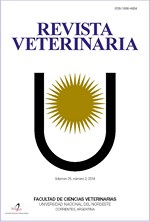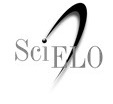Bubaline milk with a high content of trans fatty acids increased cholesterolemia and tended to aggravate atherosclerosis in rabbits
DOI:
https://doi.org/10.30972/vet.3013895Keywords:
Buffalos, trans fatty acids, cholesterol, atherosclerosisAbstract
Buffalo heifers supplemented with a mixture of sunflower oil + fish can produce milk with low level saturated fatty acids (SFA, which are considered hypercholesterolemic and pro-atherogenic), and increase the synthesis of trans-11 18: 1 and cis-9, trans-11 18: 2 fatty acids (with anti-atherogenic properties). This work compared the effects of the administration to rabbits of two bubaline milk, with low and high trans/saturated fatty acids (tFA/SFA) ratio, on the development of atherosclerosis induced by cholesterol. Twenty New Zealand rabbits, males, were randomly separated into a control group (n=10) that received milk with low tFA/SFA ratio (5.3% tFA and 67.12% SFA) obtained from grazing buffalos; and a high trans group (n = 10) that received milk with high tFA/SFA ratio (25.84% tFA and 45.89% SFA) obtained from buffalos with lipid supplementation in their diet. The experience lasted 75 days and, from day 15, all rabbits were challenged with 0.93 g of cholesterol/day orally, to induce atherosclerotic lesions. The rabbits voluntarily consumed 9293.13 ml and 9930 ml of milk with low and high tFA/SFA ratio, respectively (p 0.404). Rabbits that consumed milk with a high tFA/SFA ratio increased (p 0.049) serum levels of total cholesterol (6.08 g/l), compared to the control group (5.58 g/l). No differences were detected between groups in LDL cholesterol (p 0.073), HDL cholesterol (p 0.078) and triglycerides (p 0.174). Atherosclerotic lesions were more extensive in rabbits that consumed milk with a high tFA/SFA ratio, although without statistical significance (p> 0.05) compared to rabbits that consumed milk with low tFA/SFA ratio. In conclusion, bubaline milk obtained from animals with lipid supplementation contributed to increase cholesterolemia and tended to worsen atherosclerosis in rabbits. These effects may be related to the high content of tFA of this milk.
Downloads
Downloads
Published
How to Cite
Issue
Section
License
Copyright (c) 2019 W J. Lertora, G I. Villordo, N B. Mussart, M S. Catuogno, M S.Negrette

This work is licensed under a Creative Commons Attribution-NonCommercial 4.0 International License.
Revista Veterinaria (Rev. Vet.) maintains a commitment to the policies of Open Access to scientific information, as it considers that both scientific publications as well as research investigations funded by public resources should circulate freely without restrictions. Revista Veterinaria (Rev. Vet.) ratifies the Open Access model in which scientific publications are made freely available at no cost online.











.jpg)
.jpg)



